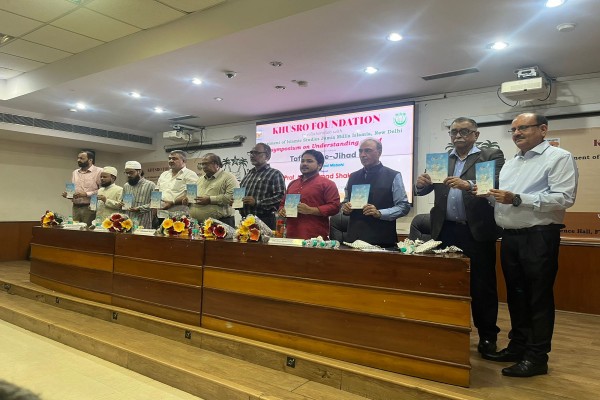Jihad is perhaps one of the most misunderstood and misused words, not just in the Islamic world, but across the earth.
Most people associate it with violent acts carried out by radical Islamic outfits like Al Qaeda, Islamic State, Boko Haram and assorted terrorist and extremist outfits operating in places like Kashmir, Pakistan, Afghanistan and other nations, who use distorted versions of the doctrine to justify their actions.
Tafheem e Jihad (Understanding Jihad), a 200-page book by Dr Zeeshan Ahmad Misbahi, a renowned classical Islamic scholar, marks a very significant and timely step towards clearing these misconceptions and misuse of this much maligned Islamic tenet.
Published by the Khushro foundation and released after a symposium on ‘Understanding Jihad’ attended by students, scholars and community leaders at Delhi’s Jamia Millia Islamia on September 4, the book, written in Urdu with other language versions in the pipeline, is being dispatched to madrasas and other centres of Islamic education across India, particularly Kashmir.
Speaking on the occasion, Indo-Islamic scholar and author Ghulam Rasool Dehlvi said: “The Quran was revealed in Arabia. It was best recited in Egypt, and was best understood in India. Tafheem e Jihad is a true testament to this historic fact.

Dr Misbahi uses rigorous academic research, scholarship and erudition to challenge the more radical interpretations of Jihad promoted by other Muslim scholars like Syed Qutb and Maulana Maudoodi, disseminated widely in places like Kashmir.
Quoting extensively from the Quran and the hadiths, he offers a nuanced interpretation of every facet of the doctrine.
“The term Jihad has several meanings in Arabic,” explains Dr Misbahi. “The greater Jihad is the internal fight with ego, while lesser Jihad is the fight with enemy in self defence, not offence,” he says.
“Jihad is an Arabic word which means positive trial, not killing,” he contends. “Islamic Jihad permits war in same manner as permitted by different countries in their defence to maintain peace and security and justice. But in 20th century, a few scholars misinterpreted the concept of Jihad in the name of Holy war and killing, which led to extremism and radicalism like the ISIS and Al Qaida etc.
“(Muslim Brotherhood’s leader) Syed Qutub of Egypt and (Jamat e Islami founder Maulana Maududi) of undivided India interpreted Jihad politically, which was far away from the soul of Quran and Hadith and the interpretation of leading Islamic scholars for 1300 years of Islamic history,” he says.
“My efforts after more than decade research and study is the right answer to radical and extremists interpretation, to remove misunderstandings and bring out the true interpretation of Jihad,” he asserts.
“Tafheem-e-Jihad” means Understanding Jihad, and it is based on authentic research of primary sources like the Quran and Hadith,” says Khusro Foundation Convenor Dr Hafeezur Rahman, who also wrote the preface to the book.
“It (the book) cites the most authentic Islamic scholars including those from Al Azhar, Egypt, to carry forward the true message of Jihad,” he says. “The concept of Jihad was politically misinterpreted by a few scholars, but this interpretation was far from the soul of the Quran and Hadith, it was a more political and radical interpretation,” says Dr Rahman.
As he explains in his preface to the book, “This book by Khusro Foundation is a groundbreaking exposition on the true nature of jihad. It’s clear, powerful narrative, backed by authentic references, makes it an invaluable resource for Muslim youth seeking to understand Islam’s true spirit.
“This book is particularly relevant in regions like Kashmir, but its importance resonates globally, offering a counter-narrative to extremist ideologies and clarifying one of Islam’s most misunderstood tenets,” he concludes.
In a career spanning three decades and counting, Ramananda (Ram to his friends) has been the foreign editor of The Telegraph, Outlook Magazine and the New Indian Express. He helped set up rediff.com’s editorial operations in San Jose and New York, helmed sify.com, and was the founder editor of India.com.
His work has featured in national and international publications like the Al Jazeera Centre for Studies, Global Times and Ashahi Shimbun. But his one constant over all these years, he says, has been the attempt to understand rising India’s place in the world.
He can rustle up a mean salad, his oil-less pepper chicken is to die for, and all it takes is some beer and rhythm and blues to rock his soul.
Talk to him about foreign and strategic affairs, media, South Asia, China, and of course India.





